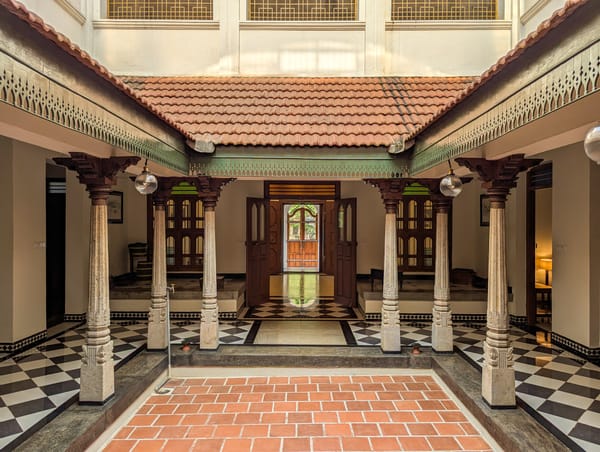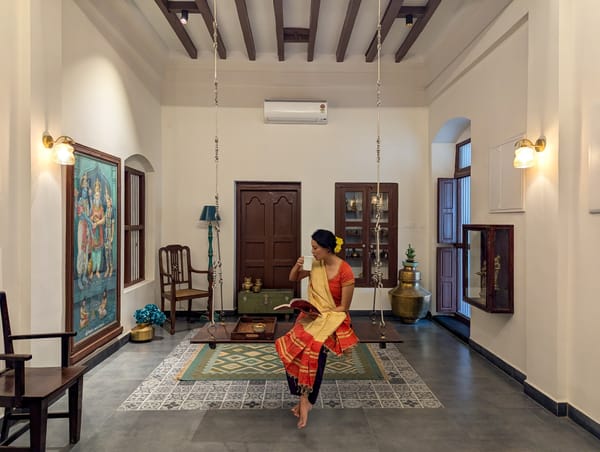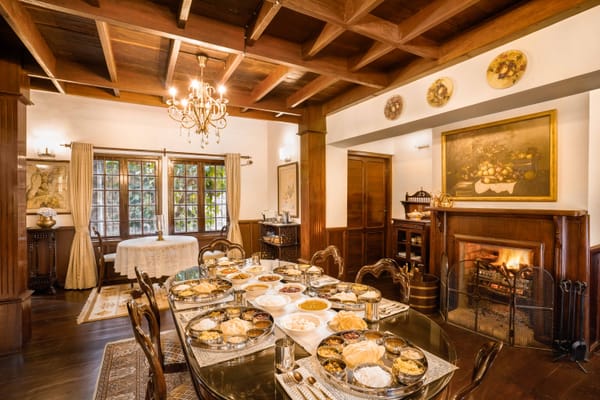4 Best Indian History Museums in Ahmedabad
A few prosperous families took up the onus of education and cultural upliftment of locals after independence. Such families established museums in Ahmedabad displaying collectibles from around the country. These museums pay tribute to the philanthropic work of the elders in their families.

A few prosperous families took up the onus of education and cultural upliftment of locals after independence. Such families established museums in Ahmedabad displaying collectibles from around the country. These museums pay tribute to the philanthropic work of the elders in their families.
Ahmedabad being the design capital of the country, some of these families restored their own homes to exhibit their collections, adding a whole new dimension to the narratives of these museums.
1. Kasturbhai Lalbhai Museum
This is the residence of the Lalbhais, curated into a museum to commemorate Kasturbhai Lalbhai, a visionary. He was coined the ‘natural architect’ by Louis Kahn, the American architect who designed the IIMA.
Lalbhai set up premier institutions for education and research across India, transforming the educational, social, and cultural scene of Ahmedabad post-independence.
The House
Set amid tall trees and lush gardens, the complex consists of two century-old houses that were carefully restored by renowned architect Rahul Mehrotra. The museum's architecture merges colonial and Art Deco styles, reflecting centuries-old craftsmanship and design. The serene atmosphere here enhances the contemplative study experience for a discerning traveller.
Exhibits
The exhibits here span centuries and artistic disciplines. Some of the pieces you can see include:
- Exquisite Jain and Hindu Sculptures: Showcasing intricate religious art meticulously sculpted on rocks, alloys, wood and terracotta
- Handwoven Textiles: The textiles present traditional craftsmanship and diverse weaving techniques from different eras around the country
- Ancient Coins: The coin collection explores the economic history, knowledge of chemistry and metallurgy, and trade practices of ancient India
- Art and Artefacts: Spanning from 16th-century Mughal paintings to 20th-century works from the Bengal School of Art, these pieces illustrate the evolution of Indian art
- Colonial Architecture with Art Deco Elements: The museum's architecture merges colonial and Art Deco styles, reflecting centuries-old craftsmanship and design
The collections strike a balance between art-historical significance and the personal favourites of the collectors.
2. Indigo Museum
The Claude Batley home, which is the annexed building, houses the 'Alchemy' - an Indigo Art Museum. It showcases indigo's transformative qualities through the works of some of the world’s leading artists.
Exhibits
On display are a fascinating variety of expressions using indigo on weaves, furniture, paintings, sculptures and installations, using a variety of materials such as:
- Wood
- Steel
- Aluminum
- Marble
- Stone
- Ceramics
- Rubber
- Canvas
- Paper
Why Indigo?
Indigo was one of the most sought-after products by the East India Company. Explorations to the east happened, not just for spices and cotton, but also Indigo. Even today, Indigo remains one of the most favourite dyes among art enthusiasts. It can unleash inner creativity and foster inner wisdom as an artist works with it.
- Opening Hours: The museum remains closed on Mondays but is open on other days between 10 AM and 4 PM, sparing the lunch hours.
- Phone: +91 91040 60850
- Website: https://kasturbhailalbhaimuseum.com/visit/timings/
3. Lalbhai Dalpatbhai Museum
The Lalbhai Dalpatbhai Museum in Ahmedabad is one of India's premier institutions. It dedicates itself to preserving and showcasing the country's rich artistic and cultural heritage.
Established in 1984 by the Lalbhai family, renowned textile industrialists and philanthropists, the museum is situated on the campus of the L.D. Institute of Indology. This is a place of immersive study for a history buff.
Extensive Art Collection
The museum boasts an impressive collection of Indian art, spanning over 2,000 years. Below are its various holdings
- Sculptures: The sculpture gallery is particularly notable, featuring exquisite works from different periods and regions of India. Highlights include pieces from the Gupta, Solanki, and Gandhara periods, showcasing the evolution of Indian sculptural art.
- Manuscripts and Miniature Paintings: The museum's collection of manuscripts is among the finest in India, with over 76,000 manuscripts, including some of the oldest known texts in Sanskrit, Prakrit, and various regional languages. The miniature paintings, spanning various schools like Mughal, Rajasthani, and Pahari, offer a glimpse into the intricate artistry of Indian painters.
- Coins and Bronzes: The numismatic collection features coins from various historical periods, providing insight into the economic history of India. The bronzes, including rare pieces from South India, reflect the religious and cultural diversity of the country.
- Textiles and Woodwork: The museum also houses a significant collection of traditional Indian textiles, including rare pieces of block prints, ikat weaves, and embroidered fabrics. The woodwork section features intricately carved furniture and architectural fragments.
Special Exhibits and Galleries
The museum also features some unique displays and galleries that you should check out when you visit, such as:
- N.C. Mehta Gallery: This gallery, named after the noted art historian N.C. Mehta, houses an exquisite collection of Jain art and artefacts, including rare manuscripts and miniature paintings.
- Haveli Doors: The museum features a stunning collection of intricately carved wooden doors from traditional Gujarati havelis (mansions), showcasing the region's rich architectural heritage.
- Museum Library: The library contains a vast collection of books, journals, and reference materials related to Indian art, history, and culture, making it an invaluable resource for researchers and scholars.
Educational and Cultural Programs
The Lalbhai Dalpatbhai Museum regularly organizes educational programs, workshops, and lectures aimed at promoting an understanding of Indian art and culture.
These activities are designed to engage both scholars and the general public, fostering a deeper appreciation of India’s artistic heritage. They promise an insightful experience for the curious traveller.
Visitor Information
- Opening Hours: The museum is open from 10:30 AM to 5:30 PM, Monday to Saturday. It is closed on Sundays and public holidays.
- Location: L.D. Institute of Indology campus, Navrangpura, Ahmedabad.
- Contact Information: For more details, visitors can contact the museum at +91 79263 06888
For further details, you can visit the Lalbhai Dalpatbhai Museum website.
4. Dandi Kutir
Dandi Kutir offers a comprehensive and immersive experience into the life of Mahatma Gandhi, making it a must-visit for anyone interested in Indian history and the legacy of one of the world’s most influential leaders.
A Tribute to Mahatma Gandhi's Legacy
Dandi Kutir, located in Gandhinagar, Gujarat, is a unique museum dedicated to the life and legacy of Mahatma Gandhi. The museum, shaped like a giant salt mound, symbolizes Gandhi's historic Salt March of 1930, a pivotal event in India's struggle for independence.
Key Highlights:
- Interactive Exhibits: The museum utilizes state-of-the-art technology, including multimedia presentations, 3D visualizations, and interactive displays, to narrate Gandhi's life journey from his birth to his role in the Indian independence movement.
- Historical Artifacts: It houses a vast collection of artefacts, photographs, and documents that provide deep insights into Gandhi's philosophies, his methods of non-violent resistance, and his impact on the world.
- Educational Experience: Visitors can engage with various interactive displays that illustrate Gandhi's teachings, his campaigns, and the socio-political context of his times.
Visitor Information:
- Opening Hours: The museum is open from 10:30 AM to 5:00 PM every day except Mondays.
- Location: Situated in Gandhinagar, it is easily accessible from Ahmedabad.
For more details, visit the official website.
Immerse Yourself in Gujarati History
Book your stay at Fouzdar House and have easy access to all the museums in the city. Our host will help you plan your visits by interspersing experiences and meals during the day. They will ensure that guided tours are booked in these museums to enhance your experiences.



